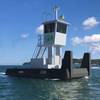The Ship Operations Cooperative Program (SOCP) Co-chairmen, CAPT Lee Kincaid and CAPT Robert Sheen, announced the SOCP’s plans for developing SOCP’s Maritime Smart Card pilot project at its October meeting in Norfolk, VA.
The pilot project, jointly sponsored by the SOCP and the Maritime Administration (MARAD) and led by SOCP Working Group Chair, CAPT Charles Pillsbury of MITAGS, will use SOCP and MARAD matching funds. The General Services Administration (GSA), experts in smart card technology development, was commissioned to develop a maritime smart card requirements analysis using information and data gathered from joint planning meetings comprised of a cross-section of the maritime industry and the Coast Guard. GSA will also assist with project implementation.
SOCP’s pilot is designed to demonstrate and validate the functionality and applications of the smart card on board ship and will focus on demonstrating that any or all of the tasks related to Mariner Access and Physical Identification, Training Records and Fraud Prevention, and Single Swipe Mariner Sign-On can be automated on board the vessel so that they are accurate, less expensive, accomplished faster, and are less manpower intensive. Applications have the potential to greatly improve business practices, processes, and create efficiencies.
A recent study requested by the International Maritime Organization identified over 12,000 seaman’s documents and/or training records that were fraudulently obtained. The SOCP and MARAD believe there is a definite need to provide secure access to ships and port facilities by properly identifying personnel. Recent terrorism attacks emphasize the need to ensure an even higher level of security.
The SOCP plans to implement its pilot project in the following three phases:
Mariner Access and Physical Identification - Provide positive identification of the seaman based on state of the art bio-identification. The active identification of a seaman will provide security for port areas and the vessel and provide the foundation for development of Phase Two and Three that will depend on the absolute identification of the personnel involved.
Mariner Training Records and Fraud Prevention - Reduce the opportunity for fraud in the issuing of STCW valid seaman’s documents. The SOCP Maritime Smart Card will provide a means to document and validate the “underlying training” which is the responsibility of the employer and is used to support the STCW documents. The SOCP Maritime Smart Card can also support the various proposed CBT and Distance Learning Programs to ensure positive identification of trainees, centralized record keeping, and proper records of on board training and certification for license advancement and certificate renewals.
Single Swipe Mariner Sign On - The final phase will provide the opportunity to reduce the time and effort required transferring the necessary information to engage a seaman in the employ of the vessel while increasing the accuracy of the information. At present, during the course of the engagement process the seaman is asked a series of up to 30 questions, including personal identification information. The difficulty is that the seaman must respond to the same questions multiple times after which the information has to be manually entered into a computer each time the seaman joins a different ship. By designing and providing an interface for the various vessel administration programs the project will improve the quality of the data as well as reducing the workload on senior staff.
Featured videos

Inside the Electrified Truckable Tug

Inmarsat Enhances Service to Drive Digitalization

Tracking Foreign Vessels Working in the U.S. Jones Act Market
Subscribe for
Maritime Reporter E-News
Maritime Reporter E-News is the maritime industry's largest circulation and most authoritative ENews Service, delivered to your Email five times per week








